How a newly carved two metre high Khachkar, a traditional Armenian stone cross, came to be installed in Canterbury Cathedral’s memorial garden in March 2019 is a surprising tale involving a retired Brigadier who had been Receiver-General of Canterbury Cathedral and an Armenian electronics engineer.
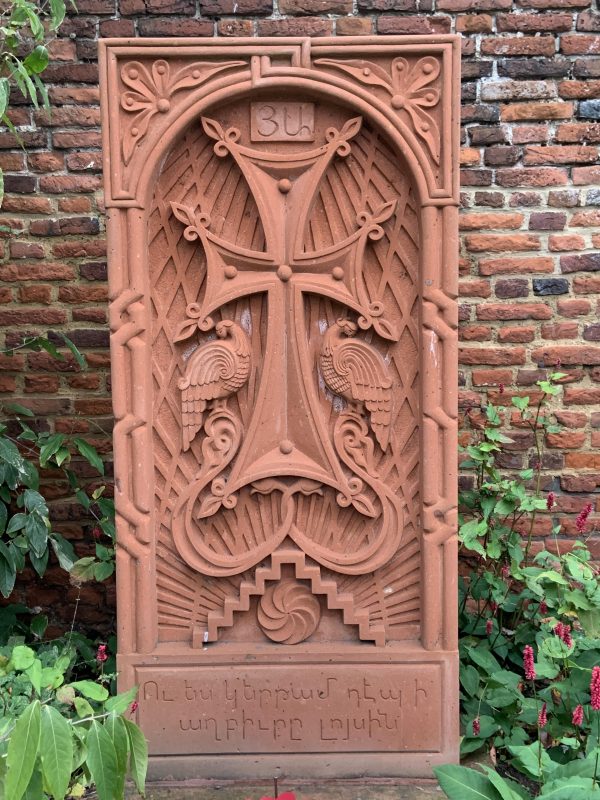
An Armenian Khachkar installed in Canterbury Cathedral’s Memorial Garden in March 2019
This duo has produced what must be one of the most important new works of art within the cathedral precincts for some years.
Vartan and Shoghig Moskofian, both Armenians, had recently moved to Oare. Exploring Canterbury one evening, they encountered two ladies shutting up a ‘pop-up shop’ of stone carving. Vartan, was intrigued – as a schoolboy he used to sit at the back of the class carving figures in chalk with a pin. He engaged in conversation with the ladies which in turn led to him enrolling with Pure Form, an amateur stone sculpture group in Canterbury.
One day, after chatting to fellow member, Brigadier John Meardon, about the plinths in the cathedral precinct which were empty, lacking sculptures, Vartan went home and continued the conversation with his wife. Shoghig, a lawyer who works at Tassells, suggested a Khachkar. In the end the Khachkar stands alone in the memorial garden, not on a plinth.
Khachkars have a long history, stretching back to the ninth century. Astonishingly about 40,000 survive, mostly free-standing, including some 900 at the Noraduz cemetery on the shore of Lake Sevan in Armenia. Traditionally they feature a cross above a rosette surrounded by interlacing patterns often featuring grapes, pomegranates and leaves.
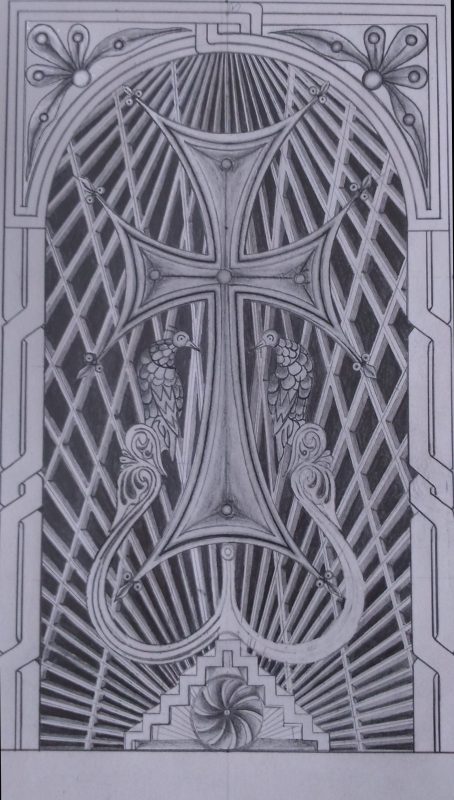
A drawing by Vartan Moskofian for an Armenian Khachkar
‘It was a big challenge, but John liked my initial sketches and asked me to develop them further.’ Next John asked the Dean and Chapter if they would be happy to accept the cross as a loan.
The idea seemed very apposite given Archbishop Randall Davidson’s campaign to draw attention to the horrific massacre of 1.5 million Armenians between 1914 and 23. He is buried in the Cloister and has a memorial inside the Cathedral.
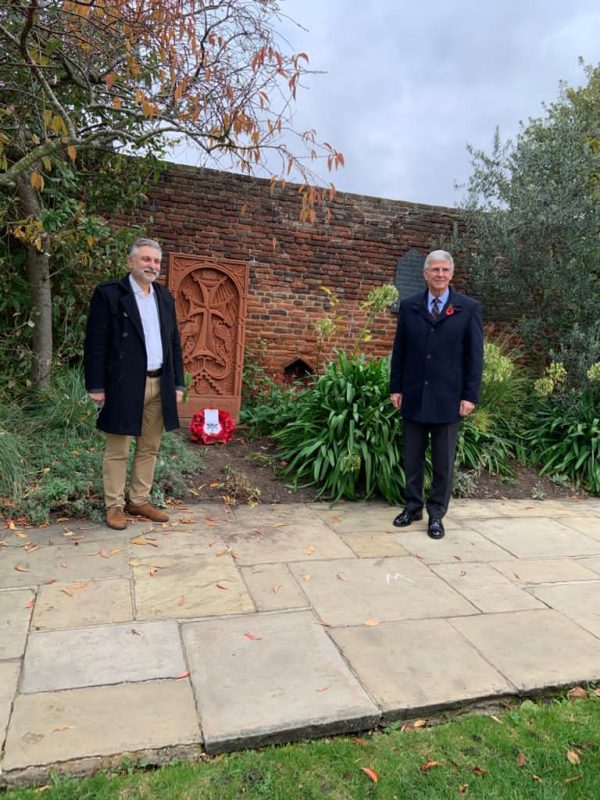
Stone carvers, Vartan Moskofian and Brigadier John Meardon standing in front of their Armenian Khachkar
Vartan imposed one condition on John: ‘We are doing this together.’ It proved to be a fruitful partnership. ‘It is an example of two nations working in collaboration. John is very precise and was invaluable in sorting out all the complicated logistics of bringing the half ton block of stone from Armenia to England.’
Initially they had thought of using limestone, but decided against it as it would only last for a hundred years or so. Instead they opted for a terracotta-coloured Armenian stone made from compressed volcanic ash. Generous donors funded the project, but the excessively cold Armenian winters meant that they had to wait a few months until the quarry reopened for business in the spring to obtain the stone. Then followed a long journey on trucks and boats via Georgia and Bulgaria before it finally arrived in Dover.
John and Vartan began carving in July 2018. There was no rhyme or reason as to who carved which section, they worked harmoniously together – ‘we complement each other. It was a joy spending time with John, I am fascinated by his life.’
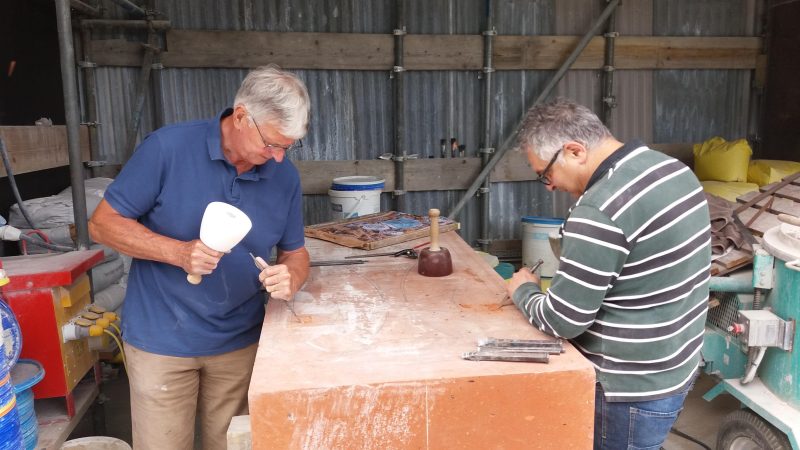
John Meardon and Vartan Moskofian start work on the Khachkar
The Canterbury khachkar incorporates traditional Armenian liturgical symbology: there is a wheel of infinity, two peacocks and steps representing the ascent to heaven. There is also an inscription in Armenian which translates as ‘And I go towards the source of the light’.
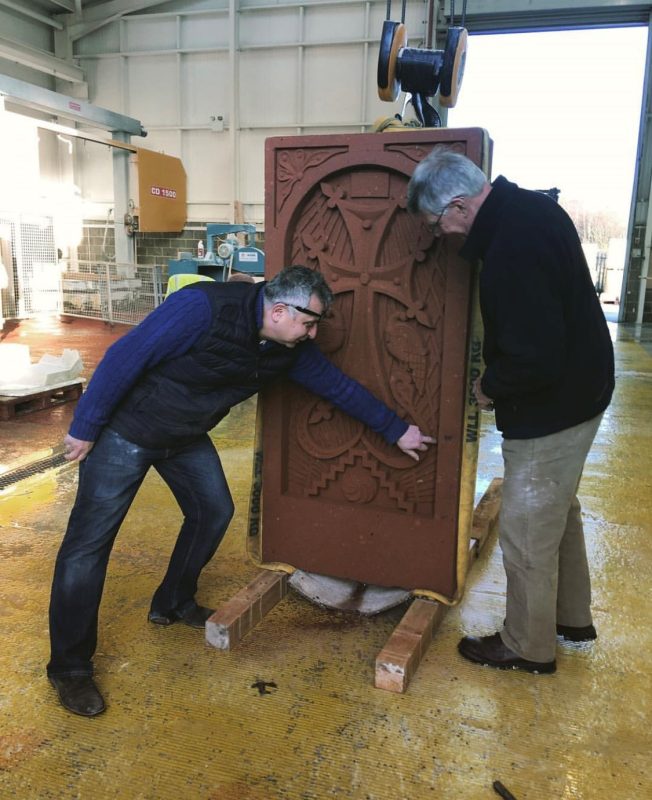
Vartan Moskofian and John Meardon examining their great work of art
The Khachkar was installed in the Cathedral’s memorial garden and blessed by Bishop Hovakim Manukian on 2nd March 2019. The Bishop together with Archbishop Justin Welby then laid a wreath on the tomb of Archbishop Randall Davidson after the ceremony.
Increasing numbers of Armenians are visiting the Kachkar. Since the invasion of Ukraine the Kachkar has an even more potent significance as a memorial to the horrors of war and as a symbol of reconciliation.
https://vimeo.com/395956809/211c17c70f
Text: Amicia de Moubray. Photographs: Vartan and Shoghig Moskofian